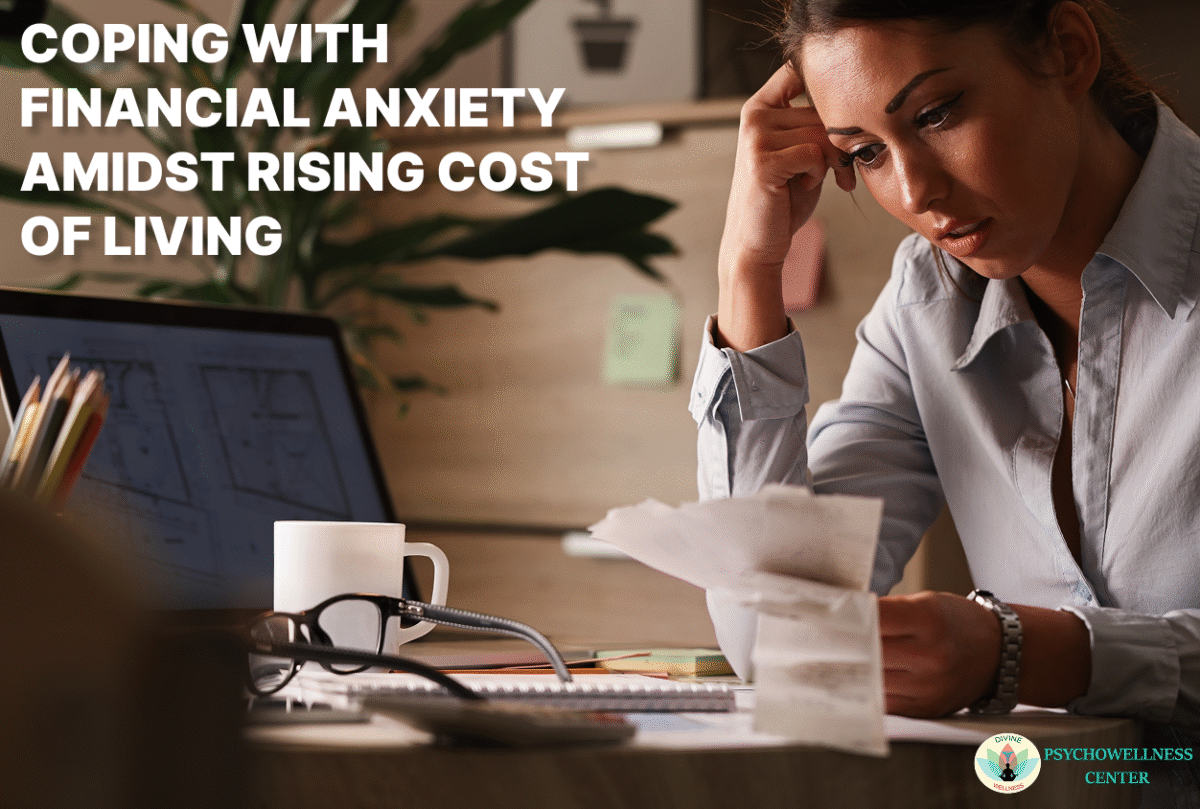In today’s economic climate, many individuals and families find themselves burdened by the escalating cost of living. From groceries to housing, fuel to utilities, everything seems more expensive than ever before. This sharp rise in daily expenses is triggering a common yet often unspoken struggle: financial anxiety. Unlike short-term financial stress, financial anxiety tends to be long-lasting and overwhelming, often impacting a person’s emotional well-being, relationships, and even physical health.
What Is Financial Anxiety?
Financial anxiety refers to a persistent state of unease, worry, and fear related to one’s financial situation or future. This form of anxiety isn’t limited to those living paycheck to paycheck. Even individuals with stable incomes may feel overwhelmed by future uncertainties, debt, inflation, and economic instability.
Why the Cost of Living Is Rising
The cost of living has significantly increased as a result of the worldwide inflation surge. Contributing factors include:
- Post-pandemic supply chain disruptions
- Increased demand for goods and services
- Energy crises and global political instability
- Real estate and rental market inflation
These economic shifts leave consumers paying more for the same essentials, creating an atmosphere of insecurity and unpredictability.
The Psychological Toll of Financial Strain
Financial anxiety isn’t just about money it’s about control, or rather, the lack thereof. When individuals feel they can’t manage or predict their financial future, it can lead to:
- Insomnia
- Irritability and mood swings
- Relationship conflicts
- Poor concentration
- Depression and general anxiety disorders
In extreme cases, it may even contribute to suicidal ideation, especially when debt feels inescapable (Wilkinson et al., 2022).
Strategies to Cope with Financial Anxiety
While financial challenges may not be resolved overnight, there are ways to reduce anxiety and regain a sense of control. Here are practical strategies that can help:
1. Acknowledge Your Feelings
Suppressing financial stress can make it worse over time. Journaling or talking to a trusted person can help in identifying the specific triggers and emotions tied to your financial concerns.
2. Create a Realistic Budget
Budgeting gives you a clearer picture of where your money is going and what adjustments can be made. Start with:
- Tracking all expenses for 30 days
- Categorising needs vs wants
- Cutting down non-essential spending
Apps like Mint, YNAB (You Need A Budget), or even a simple spreadsheet can simplify this process.
3. Prioritise Emergency Savings
Even a modest emergency fund can significantly reduce anxiety. The goal doesn’t have to be thousands of dollars right away starting with ₹500 or ₹1,000 per month can create a cushion over time.
4. Seek Professional Guidance
Financial planners, credit counsellors, or even online money management courses can offer tailored advice. For those dealing with overwhelming debt, consulting a certified financial counsellor can open up options like debt consolidation or restructuring.
Mental health professionals, particularly financial therapists, are trained to address the emotional side of money management.
5. Practice Mindfulness and Stress-Reduction Techniques
Mindfulness practices such as meditation, deep breathing, or yoga can calm the nervous system and reduce the intensity of financial fear. These techniques help reframe anxious thoughts and prevent panic-driven decisions.
6. Avoid Doomscrolling Financial News
Constant exposure to negative economic headlines can amplify anxiety. Limit news consumption, and focus instead on reliable financial education sources that empower rather than scare.
7. Foster Open Conversations About Money
Financial anxiety often thrives in secrecy. Talking openly with your partner or family can reduce feelings of isolation and develop shared goals. If you’re in a relationship, financial transparency and cooperation are crucial for managing shared responsibilities.
8. Set Small, Achievable Goals
Setting micro-goals like reducing your monthly grocery bill by 10% or saving ₹500 this week can give you a sense of accomplishment and progress.
- Engage in Community Support
Many communities offer free resources, such as financial literacy workshops, food pantries, or utility assistance programs. Don’t hesitate to seek help using available resources is a sign of resilience, not weakness.
10. Don’t Let Shame Hold You Back
A significant barrier to seeking help is the shame or guilt around financial problems. Remember, you are not alone. Millions of people globally are facing similar challenges. Replacing self-judgment with self-compassion is essential for healing.
Conclusion
The rising cost of living is an undeniable stressor in today’s world, but financial anxiety doesn’t have to control your life. With practical tools, emotional support, and proactive planning, it’s possible to navigate uncertain economic times with resilience and clarity. Remember, managing your mental well-being is just as crucial as managing your money. Seeking professional help whether financial or psychological is not a failure but an investment in your future stability and peace of mind. If you’re searching for the best support to cope with the stress and emotional toll of financial anxiety, consider reaching out to experts who can guide you through this challenging period.
Centres like the Psychowellness Center in Janakpuri and Dwarka Sector-17, Delhi, offer expert emotional wellness services, personal development, and therapy. Prefer privacy or flexibility? TalktoAngel in India offers online therapy with licensed psychologists, providing a safe space to discuss your struggles. Connect with them at 011-47039812 or 7827208707 and take the first step toward a balanced and healthier mindset in these challenging times.
Contributed by Dr. RK Suri, Clinical Psychologist, Ms. Tanu Sangwan, Counselling Psychologist.
This blog was posted on 19 August 2025
References
American Psychological Association. (2023). Stress in America™ 2023: The State of Our Nation. Retrieved from https://www.apa.org/news/press/releases/stress/2023/report
Wilkinson, L., Parise, C. A., & Avellar, S. (2022). Financial strain and mental health: The hidden burden of economic stress. Journal of Mental Health and Social Behaviour, 19(3), 112-125. https://doi.org/10.1016/j.mhsb.2022.04.006
Garman, E. T., Kim, J., Kratzer, C. Y., Brunson, B. H., & Joo, S. H. (2020). Workplace financial education improves personal financial wellness. Journal of Financial Counselling and Planning, 31(1), 79-92. https://doi.org/10.1891/JFCP-20-0008
https://www.psychowellnesscenter.com/Blog/handling-financial-inequality-as-a-couple/
https://www.talktoangel.com/blog/professional-tips-to-battle-financial-insecurity
https://www.talktoangel.com/blog/eap-support-for-reducing-employees-anxiety-and-depression

